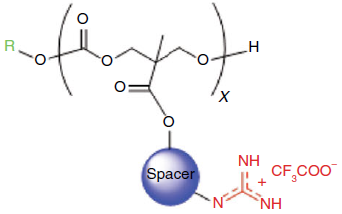Researchers have developed polymeric materials that are able to kill multidrug-resistant bacteria without inducing drug resistance or toxic side effects, according to a report in Nature Communications (March 2018). The polymers, known as guanidinium-functionalized polycarbonates, contain a polycarbonate backbone to which a hydrophobic spacer group carrying a guanidinium C(NH2)3+ group is attached. The positively charged guanidinium group enables the polymer to be prepared as a water-soluble salt as well as to bind to the negatively charged cell walls of bacteria. After attachment, the polymer penetrates and crosses the cell membrane and then precipitates the proteins and genes in the cytoplasm, effectively killing the bacteria. Antibiotic resistance in bacteria is a serious problem worldwide, with the World Health Organization in January 2018 reporting 500,000 people with suspected antibiotic-resistant infections in 22 countries. See also: Antibiotic; Antibiotic resistance; Antimicrobial agents; Drug resistance; Infectious disease; Polymer

In the study, antibiotic polymers effectively treated mice infected with multidrug resistant Gram-negative A. baumannii, K. pneumoniae, and E. coli and Gram-positive methicillin-resistant S. aureus (MRSA). Within three days after treatment, the polymers had completely degraded. Repeated treatment at sublethal doses did not produce resistant bacteria, and high doses did not produce toxic effects in the liver or kidneys. See also: Bacteria; Medical bacteriology; Methicillin-resistant Staphylococcus aureus (MRSA)
The researchers said that these polymers have great potential as broad-spectrum antimicrobial compounds for treating multidrug-resistant infections. The next phase of their research will be to determine whether the polymer builds up in the body. If the researchers make it past that hurdle, testing in humans will, hopefully, follow.





